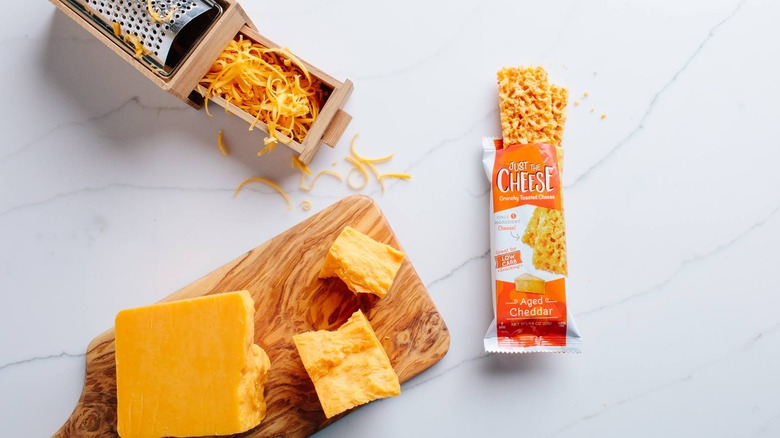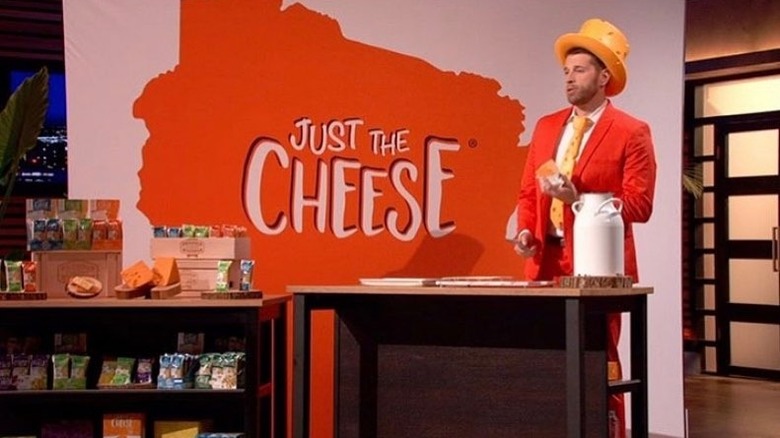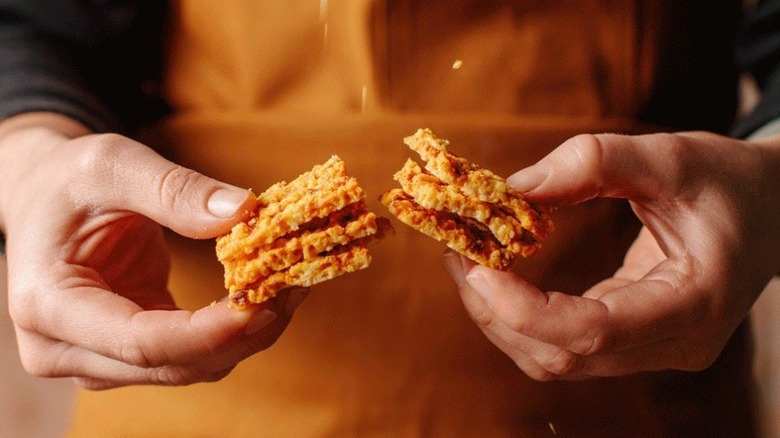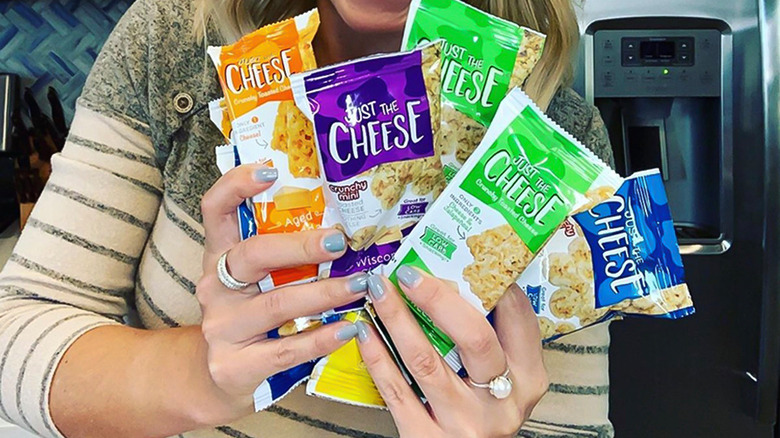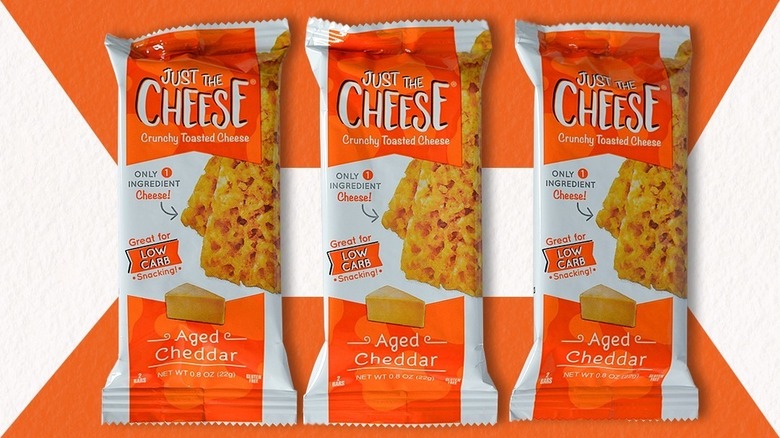Just The Cheese: Here's What Happened After Shark Tank
We may receive a commission on purchases made from links.
Entrepreneur David Scharfman grew up in the cheese business in Wisconsin, so it should have come as no surprise that his appearance on Season 11 of "Shark Tank" was related to this delicious dairy-based product. Inspired by the cheese that drips into the pan and becomes crunchy during the making of grilled cheese sandwiches, Scharfman's company, aptly named Just The Cheese, was making crunchy, all-cheese snack bars available in a variety of flavors.
The Sharks were impressed by the snack bars, which, in addition to being made with real cheese, contained zero sugar and gluten and were low in carbs and calories (only 75 calories for each bar, or 150 per package of two). However, they seemed more impressed by the company's sales figures. According to Scharfman, Just the Cheese achieved $3.5 million in revenue in its first year and was selling between 400 and 700 boxes daily on Amazon. Availability was a key component in these robust sales numbers; in addition to Amazon, the products were being sold in about 700 retail outlets. The keto trend also played a significant role in driving initial interest in Just The Cheese products.
Shark Kevin O'Leary, however, wasn't impressed by the company's margins. Just The Cheese was producing bars at a cost of 95 cents each, and wholesaling them for $1.27, against a retail cost of $1.99. "That's terrible margins," O'Leary bluntly said. But would Scharfman go on to make a deal anyway?
What happened to Just The Cheese on Shark Tank
David Scharfman's asking price for a $500,000 investment in Just The Cheese was 5% equity in the company. This ambitious request was based on his high sales figures. Kevin O'Leary — who was joined on the Shark panel by regulars Lori Greiner, Mark Cuban, Robert Herjavec, and Daniel Lubetzky — felt this was a situation that called for royalties rather than equity. His first offer was, indeed, royalty-based.
Sharks Cuban and Greiner scoffed at O'Leary's offer even as it was being made. O'Leary wanted a 20-cent royalty per bar in exchange for his funding and marketing savvy, an offer Scharfman wasted little time in refusing. Herjavec declined to make an offer, citing his dislike for the taste of Just The Cheese snack bars. Greiner and Lubetzky also declined, pointing to competition in the cheese snack category. Cuban initially did the same.
Greiner soon re-entered the bidding, asking for a 15-cent royalty per bar in perpetuity. Scharfman countered with 5 cents per bar for a decade. When Greiner opted out again, Cuban jumped in, offering $500,000 for 15% equity in Just The Cheese. Scharfman had a counter-offer ready for this deal as well, proposing 7.5% equity for the funding. Cuban stood firm, however, and no deal was made.
Just The Cheese after Shark Tank
Many businesses experience a sales bump following a "Shark Tank" appearance, and that was certainly the case for Just The Cheese, which sold an astounding 14,000 boxes in 24 hours after its episode aired. This accounted for a $300,000 influx in revenue in just one day.
Despite the sales uptick, David Scharfman later noted on the Outside The Tank podcast that he thinks it "would have been really cool" to get to work with Cuban. "What I should've at least floated was whether he would have taken a bigger piece ... at the better valuation," he said.
The lack of a deal on "Shark Tank" didn't inhibit the company's growth, however. The 700 stores that sold Scharfman had mentioned on the show as carrying Just The Cheese had more than quadrupled to about 3,000 by late 2020. This increase was partly due to a new product launch in over 800 Target locations. Several supermarket chains, including Lowes Foods, Sprouts Farmers Market, and Wegmans Food Markets, also began showcasing Just The Cheese products. By the end of 2020, the number of retail outlets had jumped again, this time to about 3,500.
Is Just The Cheese still open?
Just The Cheese is indeed still open, but David Scharfman no longer owns it. Although neither the price nor the exact terms of the sale were disclosed, a press release in December 2022 reported that John B. Sanfilippo & Son, Inc. had "purchased substantially all of the assets of the Just the Cheese brand business."
Given the consistent growth of Just The Cheese, the offer was likely one that Scharfman and his family found hard to refuse. Scharfman's family, who have been Wisconsin cheesemakers since 1991, helped cover the initial investment to get Just The Cheese off the ground. The buyer, John B. Sanfilippo & Sons, Inc., is a major player in the dried fruit and snack field. The company's portfolio already includes the Orchard Valley Harvest brand, as well as Fisher and Southern Style Nuts.
The acquisition of Just The Cheese seems to have already provided value to John B. Sanfilippo & Sons, Inc. The company announced its annual sales figures for the 2023 fiscal year and, based on the results — $999.7 million in net sales — appears poised to cross the billion-dollar threshold in 2024.
What's next for Just The Cheese
Despite a change in ownership, very little seems to have changed in terms of the Just The Cheese product line. The snack bars are still made from one ingredient — real Wisconsin cheese — and only three flavors are listed on the company website: Aged Cheddar, Grilled Cheese, and Jalapeño Cheese. Each is still available in packages containing two bars.
Currently, the bars remain on sale by the box online via Amazon, and are also offered nationally by retail outlets such as Walmart. Regionally, they are available through partners such as Albertsons, Hy-Vee, Publix, Safeway, Tom Thumb Market, Vons Food and Drug, Wegmans Food Market, and Winn-Dixie.
Innovation and new purchasing channels remain possibilities, however, based on statements made by Jeffery Sanfilippo, CEO of John B. Sanfilippo & Son, Inc., at the time the sale was announced in late 2022. Sanfilippo noted the brand's position as a leader in a coveted $100 million snacking category and speculated that potential changes could be forthcoming in future years.

